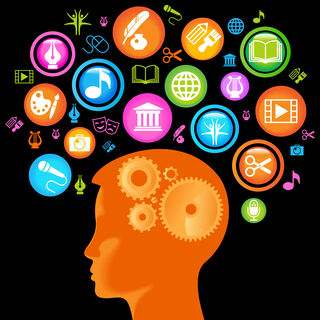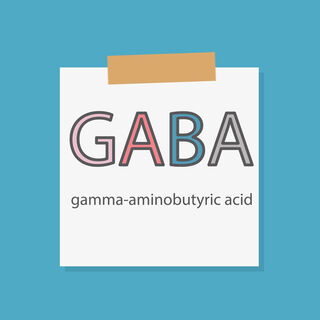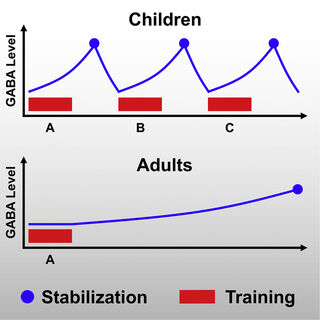Education
One Reason Kids Learn Faster Than Adults
GABA spikes when kids are learning, but doesn't when adults are learning.
Posted November 17, 2022 Reviewed by Lybi Ma
Key points
- Gamma-aminobutyric acid is a calming neurotransmitter, and it inhibits neural hyperactivity and quiets brain noise.
- Higher levels of GABA improve learning efficiency via GABAergic processes that stabilize how the brain learns new things.
- GABA levels spike when school-aged children are learning, it doesn't when adults try to learn the same thing.

Here's why most adults aren't "smarter than an 8th grader" when it comes to visual perceptual learning (VPL).
Neuroscientists at Brown University recently discovered that school-aged children experience a rapid spike in gamma-aminobutyric acid (GABA) during VPL-based training sessions. GABA levels also stay elevated for a few pivotal minutes after a training session ends. The GABAergic effects of this surge stabilize learning and make kids very efficient learners.
On the flip side, when the researchers monitored adults' brains during VPL, they found that GABA didn't spike before, during, or after visual training sessions. The researchers posit that a lack of rapid GABA boosting makes adults less efficient learners. These findings were published on November 15 in the peer-reviewed journal Current Biology (Frank et al., 2022).
"Our results imply that children exhibit highly efficient inhibitory, GABAergic processing in spite of inhibitory failures that have been observed in other domains such as cognitive control or attention," first author Sebastian Frank said in a November 2022 news release. "This implies that GABAergic processing involved in different aspects of cognitive function might mature at different speeds."
"It is often assumed that children learn more efficiently than adults, although the scientific support for this assumption has, at best, been weak, and, if it is true, the neuronal mechanisms responsible for more efficient learning in children [have been] unclear," senior author Takeo Watanabe added.

The latest study by Watanabe and colleagues used state-of-the-art functional MRS neuroimaging to compare GABA concentrations in the visual cortex of children (8-11 years old) and adults (18-35 years old) before, during, and after a visual process learning task.
How Does Rapid GABA Boosting Make Kids More Efficient Learners?
GABA is an inhibitory neurotransmitter that reduces brain noise and has a calming effect. During visual perceptual learning, less brain noise makes learning easier. Previous research has established that robust GABAergic inhibitory activity stabilizes learning as the brain retains new knowledge.
As mentioned, the researchers found that GABA levels spiked in children during the learning process and stayed elevated afterward. However, adults did not experience significant rapid GABA boosting during or after a visual perceptual learning task.
Notably, GABAergic inhibitory activity persisted in kids' brains for a few minutes after learning something new, which created stabilization in the brain. "This novel finding predicted that training on new items rapidly increases the concentration of GABA in children and allows the learning to be rapidly stabilized," Frank et al. explain in their open-access paper.

According to the researchers, this is the first study to identify that GABA levels fluctuate differently in children than adults during (and after) a visual perceptual learning task.
"We found that children exhibited a rapid boost of GABA during visual training that persisted after training ended, whereas the concentration of GABA in adults remained unchanged," the authors conclude. "[Our findings] suggest that inhibitory processing in children's brains is more dynamic and adapts more quickly to stabilize learning than in adults' [brains], making learning more efficient in children."
References
Sebastian M. Frank, Markus Becker, Andrea Qi, Patricia Geiger, Ulrike I. Frank, Luke A. Rosedahl, Wilhelm M. Malloni, Yuka Sasaki, Mark W. Greenlee, Takeo Watanabe. "Efficient Learning in Children With Rapid GABA Boosting During and After Training." Current Biology (First published: November 15, 2022) DOI: 10.1016/j.cub.2022.10.021


